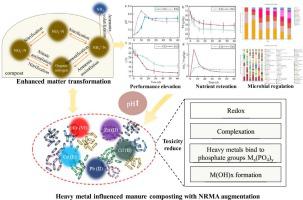Journal of Hazardous Materials ( IF 13.6 ) Pub Date : 2022-08-11 , DOI: 10.1016/j.jhazmat.2022.129762 Can Wang , Yinxue Jia , Jianpeng Li , Peng Li , Yu Wang , Fangfang Yan , Minghui Wu , Weizhen Fang , Fei Xu , Zhongping Qiu

|
Heavy metals (HMs) in husbandry waste have become a serious concern. To understand the impact of bioaugmentation on HMs-influenced composting, HMs-influenced swine manure was composted with nitrogen-retaining microbial agents (NRMA). Compared with control (CG), compost with NRMA (EG) presented a significantly lower HOAc extractable Cd (23.10%), Cu (48.15%), Cr (82.79%), Pb (4.49%), and Zn (29.15%) (P < 0.05). EG also showed 5 days longer high-temperature period during composting. After composting, EG had a 4.14% higher TN (27.93 g/kg) than CG (26.82 g/kg) but a 32.26% lower NH4+-N. The change in pH and NH4+-N driven by microbial activity was found the main reason for HMs bioavailability decrease. NRMA greatly strengthened the enrichment of HMs resistant bacteria such as Actinobacteriota and Chloroflexi in EG, whose abundance increased by 21.23% and 2473.75% compared with day 0 after composting, respectively. HMs resistance genes, such as copA (increased by 936.84%), czcA (62.95%), cadC (63.06%), and pbrT (684.08%), and chrB (16.89%), also elevated in EG than CG. Eventually, NRMA was able to regulate the microbial composition of manure composting under HMs impact, reduce HMs toxicity, and enhance composting efficiency, which should be considered for the safe disposal of such polluted waste.
中文翻译:

微生物增强对污染粪便堆肥的影响:金属固定化、物质转化和细菌反应
畜牧业废弃物中的重金属 (HMs) 已成为一个严重问题。为了了解生物强化对 HMs 影响的堆肥的影响,将 HMs 影响的猪粪与保氮微生物剂 (NRMA) 一起堆肥。与对照 (CG) 相比,NRMA (EG) 堆肥的 HOAc 可提取 Cd (23.10%)、Cu (48.15%)、Cr (82.79%)、Pb (4.49%) 和 Zn (29.15%) 显着降低 ( P < 0.05)。EG 在堆肥过程中的高温期也延长了 5 天。堆肥后,EG 的 TN (27.93 g/kg) 比 CG (26.82 g/kg) 高 4.14%,但 NH 4 + -N 低 32.26% 。pH 值和 NH 4 +的变化发现由微生物活动驱动的-N是HMs生物利用度下降的主要原因。NRMA大大加强了EG中放线菌门和绿曲菌等HMs抗性细菌的富集,其丰度分别比堆肥后第0天增加了21.23%和2473.75%。HMs 抗性基因,如copA(增加 936.84%)、czcA(62.95%)、cadC(63.06%)和pbrT(684.08%)和chrB(16.89%),在 EG 中也高于 CG。最终,NRMA 能够在 HMs 影响下调节粪便堆肥的微生物组成,降低 HMs 毒性,提高堆肥效率,应考虑到此类污染废物的安全处置。



























 京公网安备 11010802027423号
京公网安备 11010802027423号